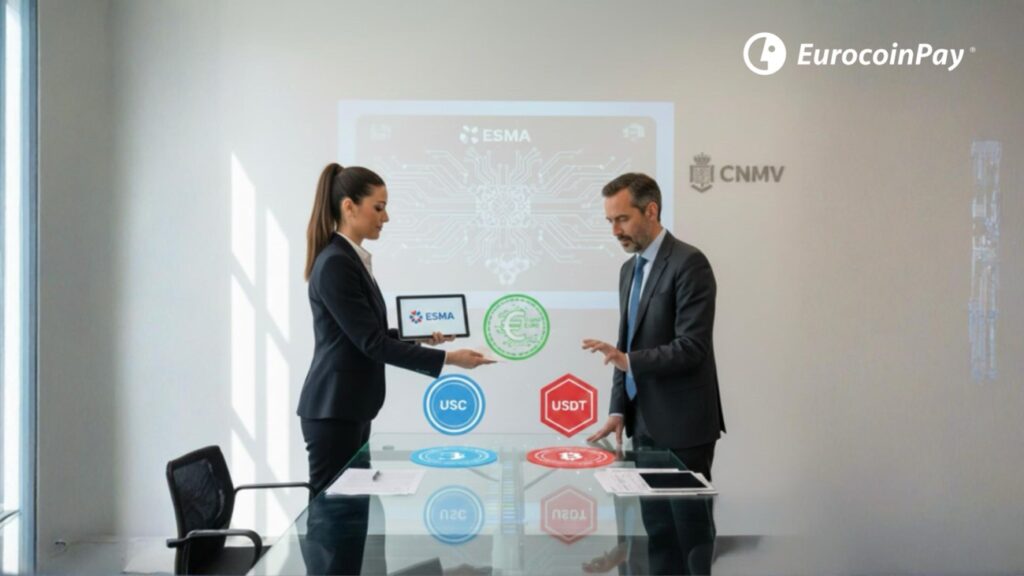A GUIDE FOR INDIVIDUAL INVESTOR
The Euro Payments Area (SEPA) opens up a world of possibilities for cryptocurrency enthusiasts looking to invest in this fast-growing digital asset. With over 440 million inhabitants and a combined GDP of €13 trillion, this region offers fertile ground for exploration and profit generation. However, to navigate this landscape effectively, it is crucial to understand the relationship between the SEPA area and the crypto world, including existing regulatory frameworks, adoption trends and future prospects.


Regulatory framework
As with corporates, the regulation of cryptocurrencies in the SEPA area is still developing. The MiCA Directive has not yet been fully implemented, and only a few countries have started to implement their own regulations. However, MiCA is expected to come into force by mid-2024, providing a harmonised regulatory framework for the region.
Country-by-Country Analysis
While investing in cryptocurrencies is not without risk, understanding each country’s individual situation can help you make informed decisions:
Countries with MiCA in implementation:
Germany, France, Italy and Spain: offer an attractive starting point due to their size, economic stability and existing regulatory frameworks. Investing in these countries can allow for early market entry and simplified regulatory compliance.
Countries with strong interest in Cryptocurrencies:
Cyprus, Greece, Latvia, Liechtenstein, Lithuania, Luxembourg, Malta, Monaco, Netherlands, Poland, Portugal, United Kingdom, Czech Republic, Romania, San Marino and Switzerland. All of them show a strong interest in cryptocurrencies and are actively working on regulations or exploring the adoption of MiCA in the future. These countries may present long-term opportunities.
Countries with a negative or uncertain position:
Norway: rejects cryptocurrencies due to environmental concerns.
Iceland: Bans the use of cryptocurrencies if they lead to capital outflows from the country, but allows investment in Bitcoin mining.
Hungary: The Central Bank has urged a ban on cryptocurrencies.
Greece: Investment in cryptocurrencies does not have a positive image due to the financial crisis.
Sweden: Has led the call for a cryptocurrency ban due to energy concerns.
Ireland: Accepts cryptocurrencies, but has not issued regulations or considered them legal tender. A tax on Bitcoin gains is being considered. This case requires further study.
Investment strategies
When investing in cryptocurrencies in the SEPA area, consider the following:
- Prioritise countries with implementing MiCA: Look for opportunities in these countries to reduce regulatory risks.
- Research country-specific regulations: Understand the rules and restrictions before investing.
- Diversify your portfolio: Invest in a variety of cryptocurrencies to reduce risk.
- Start small: Invest an amount you can afford to lose.
- Store your cryptocurrencies safely: Use secure wallets to protect your assets.
- Stay informed: Follow the latest news and developments in the world of cryptocurrencies.
The SEPA area offers an exciting landscape for cryptocurrency investors, with significant growth potential. However, it is crucial to invest responsibly and knowledgeably. By understanding the regulatory frameworks, country-specific trends and effective investment strategies, you can make informed decisions and take advantage of the opportunities this region has to offer. Remember that investing in cryptocurrencies always involves risk, so research and caution are essential.
Disclaimer: The information set out herein should not be taken as financial advice or investment recommendations. All investments and trading involve risk and it is the responsibility of each individual to do their due diligence before making any investment decision.




